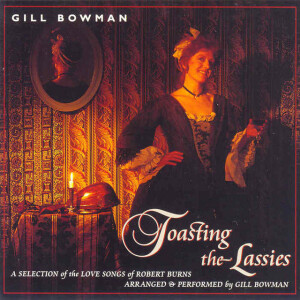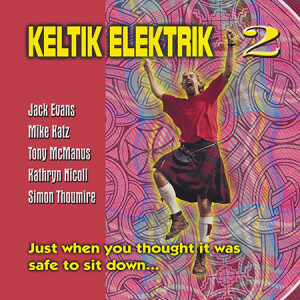 Gill Bowman’s Toasting the Lassies (Greentrax, 1994)
Gill Bowman’s Toasting the Lassies (Greentrax, 1994)
Celtic Offspring’s “Nobody Cries When You Cut Up a Bagpipe” (LaughingOnion Records, 1995)
Keltik Elektrik’s Keltik Elektrik 2: Just when you thought it was safe to sit down (Greentrax, 2000)
Conor McCarthy and Alph Duggan’s Selection Box (Twin Records Ireland, 2000)
Rod Patterson’s Rod Patterson Sings Burns: Songs from the Bottom Drawer (Greentrax, 1996)
Chuck Lipsig wrote this review.
We’ve just gotten through the coldest two months in the annals of Florida weather, and I’ve just discovered that, after 12 years down here, I’ve gotten soft. All those years being raised on the snow-swept shores of Lake Ontario have gone for naught. I used to be able to wait for half an hour in zero degrees Fahrenheit, never mind the wind-chill. Now I feel like my fingers are going to break off into my gloves at twenty degrees. And for all that, we didn’t even get a trace of snow, so I couldn’t prove to Derek, my five year-old, that such a thing actually exists.
Well, Derek will learn in time. But I’m not going to get my cold weather perseverance back without some effort. So I’ve gone into training. No, I’m not taking a trip up north. I’m not shutting off the heat in the house. And I’m not doing naked yoga in the freezer. (I have probably just lost half my readers with that image, but left the other half paying very close attention.)
What I have been doing is listening to a lot of Celtic music. Problem is that it’s not working. The music may be from a cold weather climate, but it doesn’t exactly put a chill in the air. Indeed, the good stuff makes things hot. Hmm … maybe that’s the idea.
 I grew up on the east end of the Great Lakes. Near-about dead center of the lakes is Sarnia, Ontario, which happens to be where Celtic Offspring is located. This group debuted in 1995 with Nobody Cries When You Cut Up a Bagpipe, the title being the punch line to the riddle, “What’s the difference between an onion and a bagpipe?” With Tom Robinson (percussion, shuttlepipes, tin whistle), Ken McLachlin (vocals, guitar), Ed Nicol (vocals, guitar, mandolin, fiddle) and Scott Henderson (pipes, tin whistle), this CD is straight-ahead up-tempo Celtic and Celtic-inspired music.
I grew up on the east end of the Great Lakes. Near-about dead center of the lakes is Sarnia, Ontario, which happens to be where Celtic Offspring is located. This group debuted in 1995 with Nobody Cries When You Cut Up a Bagpipe, the title being the punch line to the riddle, “What’s the difference between an onion and a bagpipe?” With Tom Robinson (percussion, shuttlepipes, tin whistle), Ken McLachlin (vocals, guitar), Ed Nicol (vocals, guitar, mandolin, fiddle) and Scott Henderson (pipes, tin whistle), this CD is straight-ahead up-tempo Celtic and Celtic-inspired music.
While all the tracks are good, the songs are generally the better ones. “The Ramblin’ Rover Set” features Andy M. Stewart’s “Ramblin’ Rover,” followed by the tunes “Miss Shepherd” and “Sweeney’s Buttermilk.” They could use a few more times through the tunes, but, all in all, it’s a fun set. A slow, quiet introduction on “Queen Amang the Heather” makes for a good contrast with the lustiness of the rest of the song. “The Megalomania Set” is a fine instrumental set featuring Henderson on highland pipes.
On several of the tracks including “Queen Amang the Heather” and the leadoff track of “The Old Torn Petticoat/ The Whalens,” Nicol gives a certain country flavor with mandolin-playing that I kept thinking was a banjo. If there’s any complaint to be made about this CD, it’s that some of the tracks are too short, ending just as I really start getting into them. Outside of that, this is the good stuff.
Keltik Elektrik, besides being the bane of my spell-checker’s existence, is primarily Jack Evans’s baby, although with Kathryn Nicoll on fiddle, Tony McManus on guitar, Mike Katz on small pipes, and Simon Thoumire on concertina, there’s a good group backing him up. With Evans playing an assortment of electric and acoustic instruments, Keltik Elektrik 2: Just when you thought it was safe to sit down is a strong CD.
The problem is that the tunes tend to run together. They’re all pretty much up-tempo, but not rushed, and moderately loud and with a strong beat, but not overwhelming. If anything stands above the crowd, it’s “The Fair Maid of Takla Makan,” featuring Evans on banjo. Actually, he’s also on low D whistle, electric piano, and synths, but it’s the banjo playing that makes it special. “Oranmore,” featuring Nicoll and her fiddle, has a very strong synth beat and sound effects. “Caledfwlch” is a little slower, darker, and spookier than the rest – very nice.
Over the last several months, Jack Evans has become a performer I’ve been paying more attention to. His Once Upon the Time in the North made my best of 2000 list. Individually, the tracks on Keltik Elektrik 2 range from good to great. But it needs a little more variety of style, a few slower tracks perhaps, to hold together as an outstanding CD. Still, I suspect it will be one of the more often played CDs in my collection.
The cover and liners list it as Conor McCarthy and Alph Duggan, but Selection Box is primarily McCarthy’s show, his accordion being the box referred to in the CD’s title. McCarthy plays a selection of tunes, both with and without Duggan’s accompaniment. In addition, McCarthy’s father, Johnny, gets a track, and another is sung by Duggan with McCarthy accompanying.
All in all, this is a decent but not outstanding CD. “Two Magpies,” a two-jig set consisting of “Banish Misfortune” and “Bobby Caseys” stands out with an unusual but very nice version of the former tune. “Smokey Keyboard” (“The Laird of Drumblair/ Drumnargarry”) lives up to its billing as a nicely moving set. Johnny McCarthy puts together a nice set with “The Scource” (“Caoinlaech Glas anFhomhar/ The Killarney Boys of Pleasure”). If anything fails, it’s the song, “Sliabh Gallion Braes.” Both McCarthy’s accordion and Duggan’s singing are fine, but they just fail to blend well together.
Rod Patterson has done his share in Celtic folk music. He was one of the founding members of A’ Jock Tamson’s Bairns and has been involved with The Easy Club and Ceolbeg. In between all that, he’s done several solo albums. Songs From the Bottom Drawer is an excellent collection of Robert Burns songs, backed by Norman Chalmers (another member of A’ Jock Tamson’s Bairns), Wendy Stewart (a member of Ceolbeg), Mike Katz (who’s been mentioned above with Keltik Elektrik), Tony McManus (also of with Keltik Elektrik), and Jack Evans (who has been with – stop me if you’ve heard this before – Keltik Elektrik and A’ Jock Tamson’s Bairns).
According to the liner notes, besides being written by Burns, the songs chosen are ones that Patterson had been interested in performing but hadn’t gotten around to – set aside in a bottom drawer, as it were. There are some strong performances here with Patterson singing in a clear, straightforward style. “Parcel of Rogues in a Nation” is one of the stronger tracks. Patterson calls this song “an essay in vitriol” and notes he can sing only as a lament. Nevertheless this is one of the angrier renditions I’ve heard of it. His singing of “Gloomy December” and an a cappella version of “Gae Bring tae Me a Pint o’ Wine” demonstrates his ability to use his voice as an instrument in its own right. “A Man’s a Man” is a nice light rendition. The only weak track is “Ochone for Somebody,” a lament for Bonnie Prince Charlie that crosses the line from precise to stiff and stilted.
Patterson and company deliver the solid performance that Burns’ poetry deserves. The CD is a great intro to Burns’s poetry and equally satisfying to those who already have acquired a taste for his poems and songs.
For all those compliments, I can’t quite call Songs From the Bottom Drawer the best CD collection of Burns songs I have for review. That honor goes to Gill Bowman’s Toasting the Lassies. The songs are taken from Bowman’s one-woman show about Burns and the many women in his life. How many women were in Burns’s life? Let’s put it this way, Burns had three daughters named Elizabeth by three different mothers – and those are just the known ones.
Bowman has one of the nicest singing voices I’ve heard. It’s a very polished voice with a sense of knowing. Or maybe I’m just partial to women who sing – and know how to sing – bawdy songs. While the CD doesn’t include Burns’ more colorful lyrics, there are definitely some very suggestive songs here. The highlight of the CD is “Comin’ Thro’ the Rye.” This is not exactly the one people are familiar with, though the well-known “Gin a body meet a body/Comin’ thro’ the rye,” is there. However the chorus is “Jenny’s a’ weet (wet), poor body,/ Jenny’s seldom dry:/ She draigl’t (got bedraggled) a’ her petticoatie / Comin’ thro’ the rye!” A knowingly sweet version of “Green Grow the Rashes, O” and a joyful “O, This is No My Ain Lassie” are also among the strongest tracks.
Whether instinct or study, Bowman has an excellent feel for singing the songs of Robert Burns. There is not one weak track on this CD. Somewhere, I’ve a feeling that Robert Burns is really enjoying this CD. I certainly have.
